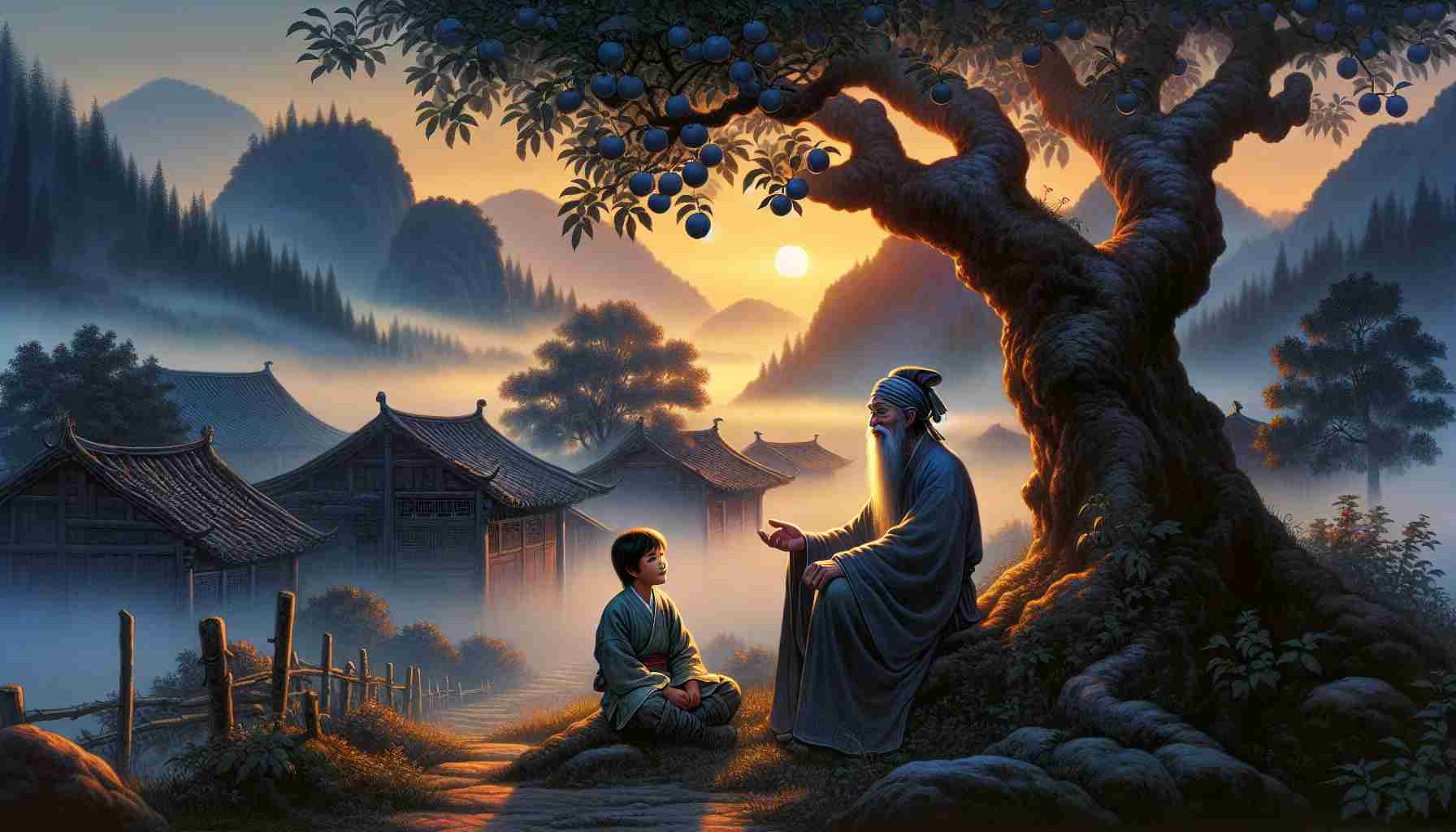

I was just a boy when I first met the man who forgot himself. I lived in a small mountain village, where the clouds brushed the ground and the rivers whispered secrets. My grandfather often spoke of strange travelers who wandered by. But none were like the man we called Shen—though I later learned his real name was Han.
He arrived on a quiet morning, with nothing but a thin cloak and the calmest eyes I had ever seen. He didn’t speak much and never asked for food. Still, we always found a way to place bowls beside him when he sat under the plum tree.
What made him special wasn’t what he did—but what he didn’t do.
He never seemed busy or in a rush. While others worked hard to grow crops or fix their roofs before winter, Shen just sat, sometimes watching ants, sometimes listening to the wind. At first, the villagers mocked him.
“What’s the use of sitting around all day?” one man laughed.
But Shen only smiled, like he knew something we didn’t.
One day, a terrible storm came. The river that ran beside our village rose fast, sweeping away carts, baskets, and everything in its path. People shouted and ran, trying to build barriers or pull things to safety. I tried too—my arms hurt, and my back was soaked. But in the end, it was no use. The river took what it wanted.
Later that night, I sat by the plum tree, angry and tired. I found Shen just sitting there, still smiling, watching the drifting mist. I couldn’t take it anymore.
“How can you be so calm? We lost so much! You didn’t even help!” I shouted.
He looked at me kindly, then asked, “Did you stop the river?”
I frowned. “Of course not.”
He nodded. “Then why fight it?”
I didn’t understand.
He told me, “When bamboo faces the wind, it bends. It doesn’t try to be a wall. And because it yields, it remains standing.”
I sat quietly, trying to feel those words.
Over the next few weeks, something changed inside me. I noticed how the birds didn’t try to outsing each other. They just sang. The trees didn’t race to grow. They just reached slowly for the sun. Even the river—wild as it seemed—was just flowing, not trying to win or lose.
I started doing less… but noticing more.
When spring came, the village rebuilt. This time, people listened more to each other, moved with the land instead of against it. And Shen? He left soon after, walking west along the mountain road without a word.
I never saw him again. But I remember what he said.
Now, when life pushes and pulls, I try not to push back. I breathe. I wait. I flow.
And though I am still learning, I understand just a little more of what it means to follow the Tao.
To live like the bamboo—strong not because it fights, but because it bends.
I was just a boy when I first met the man who forgot himself. I lived in a small mountain village, where the clouds brushed the ground and the rivers whispered secrets. My grandfather often spoke of strange travelers who wandered by. But none were like the man we called Shen—though I later learned his real name was Han.
He arrived on a quiet morning, with nothing but a thin cloak and the calmest eyes I had ever seen. He didn’t speak much and never asked for food. Still, we always found a way to place bowls beside him when he sat under the plum tree.
What made him special wasn’t what he did—but what he didn’t do.
He never seemed busy or in a rush. While others worked hard to grow crops or fix their roofs before winter, Shen just sat, sometimes watching ants, sometimes listening to the wind. At first, the villagers mocked him.
“What’s the use of sitting around all day?” one man laughed.
But Shen only smiled, like he knew something we didn’t.
One day, a terrible storm came. The river that ran beside our village rose fast, sweeping away carts, baskets, and everything in its path. People shouted and ran, trying to build barriers or pull things to safety. I tried too—my arms hurt, and my back was soaked. But in the end, it was no use. The river took what it wanted.
Later that night, I sat by the plum tree, angry and tired. I found Shen just sitting there, still smiling, watching the drifting mist. I couldn’t take it anymore.
“How can you be so calm? We lost so much! You didn’t even help!” I shouted.
He looked at me kindly, then asked, “Did you stop the river?”
I frowned. “Of course not.”
He nodded. “Then why fight it?”
I didn’t understand.
He told me, “When bamboo faces the wind, it bends. It doesn’t try to be a wall. And because it yields, it remains standing.”
I sat quietly, trying to feel those words.
Over the next few weeks, something changed inside me. I noticed how the birds didn’t try to outsing each other. They just sang. The trees didn’t race to grow. They just reached slowly for the sun. Even the river—wild as it seemed—was just flowing, not trying to win or lose.
I started doing less… but noticing more.
When spring came, the village rebuilt. This time, people listened more to each other, moved with the land instead of against it. And Shen? He left soon after, walking west along the mountain road without a word.
I never saw him again. But I remember what he said.
Now, when life pushes and pulls, I try not to push back. I breathe. I wait. I flow.
And though I am still learning, I understand just a little more of what it means to follow the Tao.
To live like the bamboo—strong not because it fights, but because it bends.